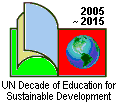|

|
Sustainable Development
"Sustainable development is development that meets the needs of the
present without compromising the ability of future generations to meet
their own needs."
(Our Common Future, Report of the World Commission on Environment and
Development, 1987).
"Human security is inconceivable without sustainable development."
As UNESCO seeks to tackle poverty through human enlightenment, our
business is to promote education for all, to enhance scientific
understanding of environment issues or social transformations, to protect
cultural diversity, and to foster greater access for all to the knowledge
societies. (Koichiro Matsuura, Director-General of UNESCO) Education is
not an end in itself.
It is one of the most powerful forces to bring about the changes in the
knowledge, values, behaviours and lifestyles required to achieve
sustainability and stability, democracy, human security and peace.
But, what is Education for Sustainable Development?
Education for sustainable development is:
-
a holistic concept whereby education is
seen as "everybody's business", for which all sectors of society are
responsible and from which all benefit.
-
a means to provide learners with the
skills, perspectives, values and knowledge to live sustainable in their
communities.
-
a tool to address major global problems
relevant for sustainable development: poverty and development,
environmental issues, ethics, health, HIV/AIDS, knowledge formation and
sharing, unsustainable consumption and production patterns, gender
equality, equity and social justice, population growth, urban and rural
transformation, sustainable governance, and cultural diversity.
-
a means to enable individuals and
communities to fulfill and enjoy their rights and responsibilities, a
way to promote civil democracy, form responsible and caring citizens,
invest in human and social capital, and reinforce the philosophy of
lifelong learning.
-
a challenge to the conventional notion of
education focused on economic and cognitive aspects of learning.
-
a long-term underlying principle for all
education plans as these are developed to achieve social, economic, and
environmental sustainability.
|